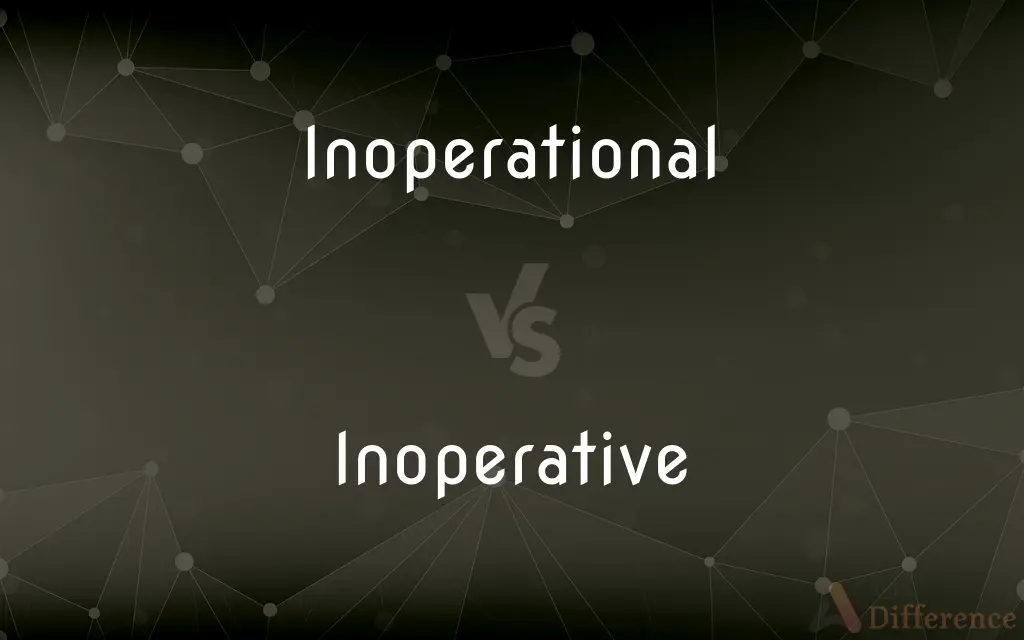Inoperational vs. Inoperative — What's the Difference?
Edited by Tayyaba Rehman — By Fiza Rafique — Updated on March 25, 2024
"Inoperational" refers to something not in a working condition or not functioning, while "inoperative" implies something is not currently working, often due to a temporary malfunction or deactivation.

Difference Between Inoperational and Inoperative
Table of Contents
ADVERTISEMENT
Key Differences
The term "inoperational" is typically used to describe equipment, machinery, or systems that are not in a state of operation, either due to failure, maintenance, or because they are not being used. It emphasizes the status of not functioning or being out of action, potentially due to inherent issues that prevent operation. On the other hand, "inoperative" often suggests that something designed to operate is temporarily not functioning or has been deliberately made non-functional. It can imply a temporary condition that might be resolved, allowing the equipment or system to become operational again.
In context, "inoperational" might be used for a broader range of situations where functionality is absent. This could include scenarios where an object has never been operational due to design flaws, lack of necessary components, or being obsolete. Conversely, "inoperative" is more commonly associated with objects that have ceased to function but were previously operational. This term is frequently used in legal and technical documents to denote clauses, rules, or machinery that are not currently active but might be reactivated.
The nuance between the two terms can also be seen in their application to describe the status of laws, agreements, or provisions. An "inoperational" law or agreement might be one that has never been enforced or is no longer relevant. In contrast, an "inoperative" law is one that has been temporarily suspended or is not being enforced at the current time, but still exists as a legal instrument that could be activated in the future.
In the realm of machinery and technology, something that is described as "inoperational" could be so due to a range of issues from critical failure to lack of maintenance or support, suggesting a more permanent state until significant intervention occurs. "Inoperative," however, might be used for equipment that is down for scheduled maintenance, awaiting parts for repair, or temporarily disabled, indicating a potential to return to a functional state.
The choice between using "inoperational" and "inoperative" can reflect the speaker's perspective on the likelihood of the object or system returning to a functional state. "Inoperational" may hint at a pessimistic view or a longer-term problem, while "inoperative" could suggest a more optimistic outlook, with expectations of resolution and return to operation.
ADVERTISEMENT
Comparison Chart
Definition
Not in a state of operation, possibly due to failure or non-use.
Temporarily not functioning or deliberately deactivated.
Connotation
Suggests a potential long-term or inherent lack of functionality.
Implies a temporary state, with the possibility of becoming operational again.
Common Usage
Broad situations including never used, obsolete, or fundamentally broken.
Objects or systems that have ceased to work but may be fixed or reactivated.
Application
Often used for equipment, systems, or laws that are out of action.
Frequently used in legal and technical contexts for temporarily inactive items.
Perspective
May imply a pessimistic view or long-term issues.
Suggests optimism for future functionality or reactivation.
Compare with Definitions
Inoperational
Not functioning due to various reasons.
The factory's main conveyor belt has been inoperational for weeks.
Inoperative
Often used in legal and technical contexts.
This regulation is currently inoperative.
Inoperational
Often due to inherent issues.
The software became inoperational after the update failed.
Inoperative
Can be reactivated.
The inoperative clauses in the contract can be enforced under certain conditions.
Inoperational
Not limited to temporary malfunctions.
Many of the older machines are inoperational due to obsolescence.
Inoperative
Temporarily not working.
The escalator is inoperative for maintenance.
Inoperational
Reflects a broad range of non-functional states.
The security system has been inoperational since the power outage.
Inoperative
Deliberately deactivated.
The nuclear facility has been made inoperative.
Inoperational
Could imply permanent dysfunction.
The old irrigation system is completely inoperational.
Inoperative
Implies a potential for resolution.
The inoperative street lights are scheduled for repair next week.
Inoperational
Not operational.
Inoperative
Not working or functioning.
Inoperative
No longer in force; countermanded
Declared the previous instructions inoperative.
Inoperative
Not working or functioning; either idle or broken.
Inoperative
(legal) No longer legally binding.
Inoperative
Not operative; not active; producing no effects; as, laws renderd inoperative by neglect; inoperative remedies or processes.
Inoperative
Not operating;
An inoperative law
Common Curiosities
Can an inoperative system become operational again?
Yes, "inoperative" often implies that the system or object can be repaired or reactivated.
Is "inoperational" the same as "broken"?
Not necessarily. While "broken" implies damage, "inoperational" can include a broader range of reasons for not working, including non-use.
How do legal documents use "inoperative"?
To denote clauses or laws that are not currently enforced but could be in the future.
Can an object be both inoperational and inoperative?
In common usage, they might be used interchangeably, but technically, "inoperative" implies a temporary state, whereas "inoperational" might suggest a broader, potentially more permanent condition.
Does "inoperational" imply a fault with the object?
It can, but it also covers scenarios where there's no fault, such as obsolescence or lack of maintenance.
Are inoperational or inoperative conditions covered by warranties?
It depends on the warranty terms and the reason for the condition.
What makes something inoperational?
It could be due to failure, lack of use, maintenance issues, or inherent flaws.
Which term should I use if I'm unsure about the permanence of a malfunction?
"Inoperative" is safer if you believe there's a chance for the issue to be resolved.
Can a previously inoperative object become permanently inoperational?
Yes, if the temporary condition is not resolved, it might lead to a more permanent state of dysfunction.
How does the choice between these terms affect business communication?
Using "inoperative" might communicate a temporary setback, potentially less alarming than "inoperational," which could suggest a significant or long-term issue.
Share Your Discovery

Previous Comparison
Package vs. Packet
Next Comparison
Repeatedly vs. RepeatablyAuthor Spotlight
Written by
Fiza RafiqueFiza Rafique is a skilled content writer at AskDifference.com, where she meticulously refines and enhances written pieces. Drawing from her vast editorial expertise, Fiza ensures clarity, accuracy, and precision in every article. Passionate about language, she continually seeks to elevate the quality of content for readers worldwide.
Edited by
Tayyaba RehmanTayyaba Rehman is a distinguished writer, currently serving as a primary contributor to askdifference.com. As a researcher in semantics and etymology, Tayyaba's passion for the complexity of languages and their distinctions has found a perfect home on the platform. Tayyaba delves into the intricacies of language, distinguishing between commonly confused words and phrases, thereby providing clarity for readers worldwide.















































